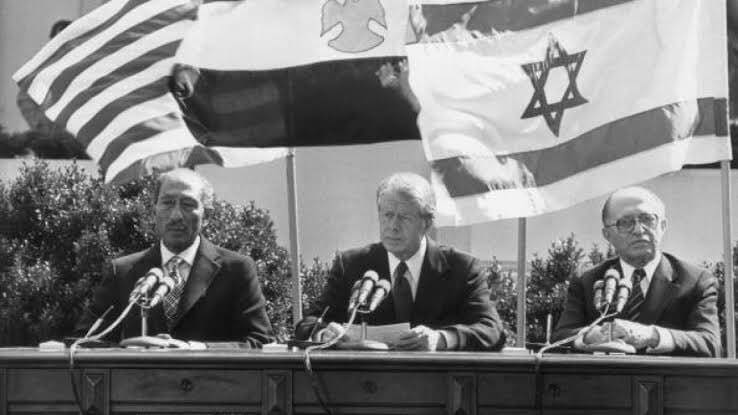Rising Tensions: The Potential Repercussions of Egypt Revoking Peace Treaty with Israel
In an era where diplomatic relations often dictate the pace of international stability, the peace treaty between Egypt and Israel, brokered under the auspices of U.S. President Jimmy Carter at Camp David in the late 1970s, stands as a testament to the possibility of peace in a region marred by conflict. This historic agreement, which led to over four decades of tranquility between the two nations, is now under a microscope due to recent political developments.

Egyptian President Anwar Sadat (left), US President Jimmy Carter (center), and Israeli Prime Minister Menachem Begin hold hands on the North Lawn of the White House as they complete the signing of the peace treaty between Egypt and Israel in Washington on March 26, 1979.
The catalyst for the current strain is Israeli Prime Minister Benjamin Netanyahu’s declaration of intent to dispatch military forces to Rafah, a city in Palestinian Gaza bordering Egypt. This move has prompted Egypt to consider revoking the peace treaty, a scenario that could have profound implications for both nations and the broader Middle East.
A Brief History of the Treaty:
The peace treaty, signed in 1979, followed negotiations at Camp David and was a pivotal moment for both nations. Israel agreed to withdraw from the Sinai Peninsula, which it had occupied since the 1967 Six-Day War, in exchange for normalized relations with Egypt. This marked the first time an Arab country recognized Israel, paving the way for subsequent peace agreements.
🇪🇬🇮🇱 Any violation of the borders by Israel will jeopardize the 1979 Egyptian-Israeli peace treaty, Secretary of the Committee on Defense and National Security of the Egyptian House of Representatives Mohammed Rady has said.
“Egypt supports the peace agreement with Israel, but… pic.twitter.com/RPN07neSkw
— Sputnik (@SputnikInt) February 12, 2024
Current Stance of Egypt:
The recent threat by Netanyahu to invade Rafah has raised alarms in Egypt, leading to potential suspension of the peace treaty. Egypt opposes any action that could force Palestinians into its territory and disrupt the flow of humanitarian aid through Rafah, the main entry point for supplies to Gaza.
Implications of Treaty Revocation:
Revoking the treaty would significantly impact military deployments for Israel, requiring a shift of focus to its southern border, previously considered a zone of peace. For Egypt, aside from the potential military and economic strains, such a move could endanger the substantial military aid it receives from the United States, a key element of their defense strategy since the treaty’s inception.

| Aspect | Details |
|---|---|
| Historical Context | Signed in 1979, the Egypt-Israel peace treaty ended hostilities and normalized relations, with Israel withdrawing from the Sinai Peninsula. |
| Recent Developments | Israeli plans to invade Rafah have led Egypt to consider revoking the treaty, amid concerns over humanitarian impact and regional stability. |
| Potential Consequences | Revocation could redirect Israeli military focus, strain Egypt’s economy, and jeopardize U.S. military aid to Egypt. The stability of the region would also be at risk. |
This unfolding scenario underscores the delicate balance of peace in the Middle East and the far-reaching consequences of diplomatic decisions. As both nations stand at a crossroads, the international community watches closely, hoping for a resolution that avoids escalation and preserves the longstanding peace that has benefited not only Egypt and Israel but the entire region.

